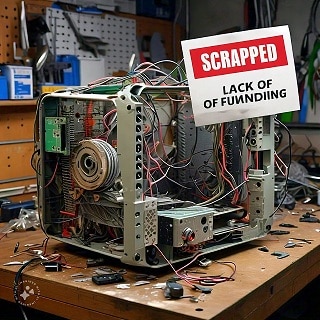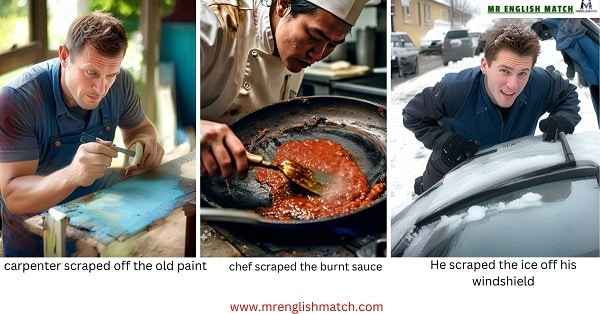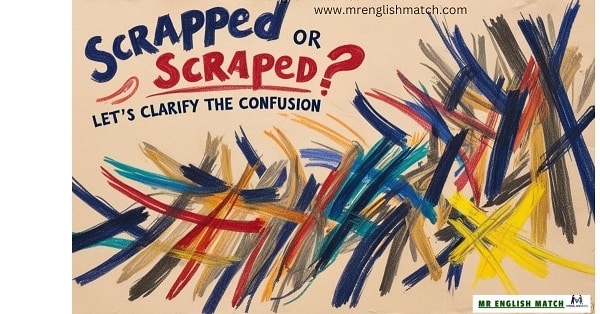When it comes to writing, even small word choices can change a sentence’s meaning entirely. This is true when deciding between scrapped and scraped. These words look and sound similar but differ in meaning, usage, and context. This article will explore the differences between scrapped vs scraped, why the confusion exists, and when to use each term.Scrapped or Scraped? Lets Clarify the Confusion.
Scrapped and scraped both serve as past-tense verbs, but they each come from different verbs: “scrap” and “scrape.” Scrapped means to throw away or abandon something, often an idea or plan. Scraped, however, refers to rubbing or scratching a surface, sometimes even implying a minimal success, like scraping by. Let’s examine each word in more detail to avoid these common mistakes.
Why is There Confusion?
The confusion between scrapped and scraped is easy to understand. Both words Scrapped or Scraped start and end with the same letters and have only a single difference in the middle. However, they belong to a category called heterographs—words that sound the same but have different meanings and spellings. The confusion worsens when these words are used in quick speech or casual writing. For anyone trying to improve their communication, understanding these differences is important.Now Scrapped or Scraped? Clarify the Confusion
Not only are scrapped and scraped heterographs, but they also share the same grammatical structure as past-tense verbs. Scrapped comes from the verb “scrap,” meaning to throw away or discard, while scraped comes from “scrape,” meaning to rub or scratch a surface. Let’s explore each word to clear up this confusion.
Scrapped or Scraped? Let’s Clarify the Confusion
The discussion about definition , explanation , examples and differences between Scrapped and Scraped are given below in detail.
What Does the Word “Scrapped” Mean?

The word scrapped means to discard or get rid of something. In context, it often refers to ideas, plans, or projects that are abandoned because they’re no longer useful or relevant. When something is scrapped, it’s typically gone for good. This term is often used in writing about decisions, where someone decides to end a project, idea, or item that’s no longer valuable.
For example, if a company decides to cancel a project, they might say, “The project was scrapped due to lack of funding.” This usage of scrapped implies a deliberate choice to abandon or eliminate something. It is commonly used in business, engineering, and other fields where things are often removed or replaced.
What Does the Word “Scraped” Mean?

The term scraped refers to rubbing or scratching a surface to remove material. Unlike scrapped, which involves abandonment, scraped usually involves physical action. When you scrape something, you remove a thin layer or clean off debris. This can also refer to minor injuries, like scraping a knee, or barely achieving something, like scraping through a test.
For example, you might say, “She scraped the mud off her shoes before entering the house.” This example shows the physical action involved. Additionally, scraped can imply barely managing to succeed, as in, “He scraped through his exams,” which suggests minimal success.
Scrapped vs Scraped: Differences
| Aspect | Scrapped | Scraped |
|---|---|---|
| Definition | Discarded or abandoned | Removed material from a surface |
| Verb Form | Past tense of “scrap” | Past tense of “scrape” |
| Context | Used for ideas, plans, or items | Used for physical actions |
| Usage | Common in business and planning | Common in cleaning or minor achievements |
| Figurative Use | Refers to abandoning plans | Refers to barely achieving something |
| Common Misuse | Confused with scraped for physical removal | Confused with scrapped for abandonment |
The difference between scrapped and scraped boils down to context and usage. Use scrapped when referring to discarded items or ideas, and scraped when referring to physical actions or minimal achievements.
Examples in Context
There are a plenty of examples about Scrapped or Scraped? Let’s Clarify the Confusion from these examples:
Examples of Scrapped:

Here are examples to illustrate the use of “scrapped,” showing its meaning as something discarded, canceled, or abandoned:
- The project was scrapped due to lack of funding, leaving the team disappointed.
- After much debate, the company scrapped the plan to launch a new product, choosing to focus on their existing lineup instead.
- Due to unforeseen delays, the city scrapped the proposal for a new park in the downtown area.
- The original concept for the movie was scrapped after negative feedback from early focus groups.
- The company scrapped the entire marketing campaign and started fresh with a new approach to reach their audience.
- Plans to renovate the historic building were scrapped when engineers discovered structural issues that made it unsafe.
- The committee scrapped the idea of hosting an outdoor event due to unpredictable weather forecasts.
- The government scrapped the controversial policy, opting for a less divisive approach instead.
- The software update was scrapped when developers realized it introduced more problems than it solved.
- With rising material costs, the manufacturing team scrapped the design for the product and went back to the drawing board.
- The company scrapped the proposal for the new branch due to budget issues.
- After much discussion, they scrapped the initial design and started over.
- The outdated policies were scrapped to improve employee satisfaction.
Each of these examples shows “scrapped” in contexts involving the abandonment or discarding of plans, projects, or ideas. This aligns with its meaning, highlighting it as a term for situations where decisions are reversed, often for practical or strategic reasons.
Examples of Scraped:

Here are examples that demonstrate the use of “scraped,” showing its meaning as a physical action of rubbing or scratching, as well as its figurative usage for narrow success or achievement:
- He scraped the ice off his car windshield early in the morning to see clearly before driving.
- After gardening, she scraped the mud off her boots to keep the floors clean.
- The toddler fell and scraped her knee on the rough sidewalk, leaving a small red mark.
- He barely scraped through the exam, passing by just one point to avoid failing.
- The chef scraped the burnt sauce from the pan before starting a new recipe.
- The carpenter scraped off the old paint from the wood to prepare it for a fresh coat.
- She scraped together enough money to pay for the last-minute trip, using every bit of savings.
- Using a chisel, the sculptor scraped the stone to shape the intricate details of the statue.
- The artist scraped excess paint off the canvas to create a textured, layered effect.
- During the renovation, workers scraped off the wallpaper that had been there for decades to reveal the wall beneath.
- He scraped the ice off his windshield before leaving for work
- She scraped her knee while hiking on a rocky trail.
- The student scraped through the final exams with a passing grade.
Each of these examples illustrates “scraped” as it refers to physical removal or effort to achieve something, emphasizing its role in actions like cleaning, preparation, or working with difficulty.
These examples highlight how scrapped and scraped differ in meaning and context. Scrapped vs scraped examples like these make it clear how to choose the right word in each scenario.
Popular Synonyms and Similar Terms to Scrapped and Scraped
Synonyms for Scrapped include:
- Discarded: thrown away or no longer needed.
- Abandoned: left behind or discontinued.
- Cancelled: decided not to continue with something.
- Eliminated: completely removed or gotten rid of.
Synonyms for Scraped include:
- Raked: pulled or removed in layers.
- Brushed: lightly removed surface material.
- Scoured: cleaned with a strong scrubbing action.
- Filed: smoothed down by rubbing with a file.
Each synonym gives a different nuance, but they all point to the main actions of discarding for scrapped and rubbing or cleaning for scraped.
Origins of Scrapped and Scraped
The word scrapped originates from Middle English and Old Norse, specifically the term “scrappe,” which referred to small pieces or fragments. This term later evolved to mean “discarding” something no longer useful. Scrapped became widely used in industrial settings to describe machinery or items discarded for recycling.
Scraped has origins in Old English and Old Norse too, from words like “skrapa,” which means “to scratch.” Scraped was initially used to describe the physical action of removing layers or dirt. Over time, it also took on a figurative meaning, such as achieving something with difficulty.
FAQ’s
What’s the main difference between “scrapped” and “scraped”?
The main difference lies in their meanings and usage. “Scrapped” means to discard, cancel, or abandon something that is no longer useful. On the other hand, “scraped” refers to the act of rubbing or scratching a surface to remove material, or it can describe achieving something narrowly, as in “scraped through.”
Why do people often confuse “scrapped” with “scraped”?
People often confuse these words because they sound similar and have nearly identical spellings. Both are past-tense verbs, but their meanings and contexts are different. Their phonetic similarity makes them easy to mix up, especially in quick writing or speech.
How can I remember when to use “scrapped” instead of “scraped”?
To remember the difference, think of “scrap” as something discarded or rejected. If you’re talking about abandoning a plan, project, or object, then “scrapped” is the right choice. For physical actions like cleaning or removing material, or when referring to narrowly achieving something, use “scraped.”
Are “scrapped” and “scraped” heterographs?
Yes, “scrapped” and “scraped” are heterographs, which means they sound similar but have different spellings and meanings. This similarity can create confusion, but knowing their specific definitions helps clarify which one to use.
Can “scraped” be used figuratively like “scrapped”?
While “scrapped” is generally used in contexts of cancellation or discarding, “scraped” can also be used figuratively to mean barely achieving something. For instance, “scraped through” implies achieving something with difficulty, unlike “scrapped,” which indicates a complete abandonment.
Conclusion
Understanding whether to use scrapped or scraped can clarify your writing and communication. Scrapped implies abandonment or removal of something unneeded, often in decision-making or planning. Scraped, on the other hand, involves a physical action or a narrow achievement. By using these words correctly, you can ensure your sentences are clear and convey the right meaning.
The difference between scrapped and scraped comes down to context and meaning. Remember that scrapped pertains to throwing away, while scraped deals with cleaning or barely succeeding. These words might look alike, but they aren’t interchangeable. Keep these distinctions in mind for precise and effective communication.
Read More:
Cacoon or Cocoon: Which Spelling is Correct?
Requester or Requestor: Which Spelling to Use?
Totalling or Totaling: Which Spelling to Use?
Sources
For more information, consult grammar guides and dictionaries that explain heterographs and common confusion in English. Resources like Merriam-Webster, Oxford English Dictionary, and grammar websites can offer further clarification.

John Robert is a seasoned grammar enthusiast and the insightful voice behind MrEnglishMatch. With years of experience in language arts and a passion for clear, effective communication, John’s blog posts blend expertise with approachable advice. His deep understanding of grammar and style helps readers sharpen their writing skills and master the nuances of English. When not blogging, John enjoys exploring new languages and reading classic literature.







